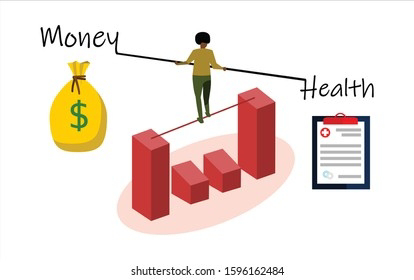HOW MONEY CAN IMPROVE YOUR HEALTH
It is worth mentioning that while money can provide access to a wide range of health benefits, the cost of healthcare can still be a significant financial burden for many people, especially those without health insurance or who have limited coverage. In such cases, it is important to find ways to manage healthcare costs effectively, such as by taking advantage of available programs and resources, negotiating with healthcare providers, and choosing low-cost but effective treatments whenever possible.
Also, having financial resources can play a significant role in improving and preserving health by providing access to necessary resources, treatments, and services. It is important to remember, however, that while money can help, it is not the only factor in determining health outcomes. A healthy lifestyle, including proper nutrition, exercise, and stress management, is also critical to maintaining good health.
Money can play a significant role in improving and preserving your health in various ways:
Access To Healthcare: Having financial resources allows you to access quality medical care, including preventative check-ups and necessary treatments, which can help to diagnose and prevent illnesses, and improve overall health.
People with more financial resources may have access to better leisure and recreational opportunities, which can include physical activity, improving overall health.
Healthy Food: Money can provide the means to purchase healthy and nutritious food, which can lead to a healthier diet and better physical health.
People with more financial resources are often able to purchase healthier food options, which can lead to better overall health and reduce the risk of diet-related illnesses.
Exercise And Fitness: Financial stability can enable the purchase of gym memberships, fitness equipment, and other resources necessary for staying active and engaging in physical activity, which is critical for good health.
People with more financial resources may have access to better leisure and recreational opportunities, which can include physical activity, improving overall health.
Stress Reduction: Financial security can relieve stress and anxiety, which can have a positive impact on physical and mental health. This can include reducing stress-related illnesses, such as high blood pressure and depression.
Financial stress is a significant contributor to poor health. Having more financial resources can reduce stress and improve mental and emotional well-being.
Comfortable Living Conditions: Money can provide access to comfortable living conditions, such as safe and clean housing, which can improve overall health and well-being.
Adequate housing is essential for good health, and having more money can provide access to safe and healthy living conditions, reducing exposure to environmental health hazards.
Time Management: With financial stability, you can afford to take time off from work and prioritize self-care, which can improve physical and mental health and lead to a better work-life balance.
Preventative Measures: Money can also be used to invest in preventative measures, such as flu shots, vaccines, and regular check-ups, which can help to prevent the onset of illnesses and promote overall health.
Medications And Treatments: Financial resources can make it possible to obtain necessary medications and treatments, which can improve health outcomes and help manage chronic conditions.
Mental Health Services: Money can provide access to mental health services, such as therapy and counseling, which can help to manage and improve mental health and overall well-being.
Healthcare-related Travel: Financial stability can allow for healthcare-related travel, such as visiting specialized medical facilities, which can improve access to necessary treatment and improve health outcomes.
While money provides access to a wide range of health care services, it is important to note that health care costs can be a significant financial burden for many people, especially those without health insurance or with limited coverage. In these cases, it is important to find ways to effectively manage your medical expenses. B. Use available programs and resources, negotiate with health care providers, and choose affordable yet effective treatments whenever possible.
Another aspect to consider is that money alone may not always guarantee access to the best possible healthcare. In many countries, access to quality healthcare can be limited by factors such as geography, socio-economic status, and race. In such cases, it is important to advocate for policies that ensure equitable access to healthcare for all, regardless of financial status.
It is also important to recognize that the relationship between money and health is complex and multi-faceted. While financial resources can certainly improve access to healthcare and improve health outcomes, there are many other factors that also play a role, such as genetics, lifestyle, and access to resources such as healthy food and clean water. Therefore, while money can certainly play a role in improving health, it is not the only factor and must be considered in conjunction with other elements.
Calculation: The availability of financial resources can play an important role in promoting and maintaining health by providing access to needed resources, care and services. But while money can help, it's important to remember that it's not the only determinant of health outcomes. A healthy lifestyle, including proper nutrition, exercise, and stress management, is also important for maintaining health.
While money can certainly play a significant role in improving and preserving health, it is not the only factor, and it is important to consider the complex and multi-faceted nature of the relationship between money and health. Nevertheless, having financial resources can provide access to necessary treatments, services, and resources that can help improve health outcomes, and it is important to find ways to effectively manage healthcare costs whenever possible.
HERE ARE A FEW REFERENCES AND RESOURCES TO EXPLORE FURTHER:
2. Centers for Disease Control and Prevention: Offers information on the importance of a healthy diet and physical activity for good health.
3. U.S. Department of Housing and Urban Development: Information on safe, affordable housing and its impact on health.
4. World Health Organization: Offers resources and information on access to healthcare and its impact on health.






Comments
Post a Comment